Immersive Learning: An Education Provider's Guide
Details: Written by Kate Hutchinson
|
Published:

It’s no secret that learners are more tech-savvy than ever before. Now that Millennials have been in the workforce for over 15 years, education providers must shift their focus towards the younger and arguably cooler Gen Z learner. Fast becoming known as ‘digital natives’, the Gen Z generation was born in the era of smartphones and has a notoriously short attention span, averaging just 8 seconds. So, how can education providers deliver inclusive and engaging educational content against such odds? The Skills Network is proud to partner with Metaverse Learning, a leading provider of immersive learning experiences. Through this partnership, The Skills Network is leading the charge towards re-imagining education delivery for its FE partners.
In this short blog piece, explore how a commitment to immersive learning technologies can help colleges re-invigorate their curriculum delivery and cut through the noise for a new generation of learners.
Readers will explore:
- What is Immersive Learning Technology?
- What is the Metaverse?
- Metaverse Learning and The Skills Network partnership
- Metaverse Learning Courses: What You Can Expect
- The Benefits of Immersive Learning for an Education Provider
What is Immersive Learning Technology?

Immersive learning is a teaching and learning approach that creates an engaging and interactive environment for learners. It often involves the use of technology, such as:
- Virtual Environments (VE)
- Virtual Reality (VR)
- Augmented Reality (AR)
Immersive learning technologies aim to increase learner engagement, retention, and understanding by making the learning process more inclusive, dynamic and experiential.
Immersive technologies can bridge the gap to hybrid working
Hybrid working is our new normal.
Understanding the modern labour market and how learners obtain their information is crucial for the education sector to stay in step with learner needs and expectations.
The current educational system remains predominantly focused on the 9 to 5 classroom-based learning experience; often leaving learners excluded, disengaged and unprepared for the real-world work environment.
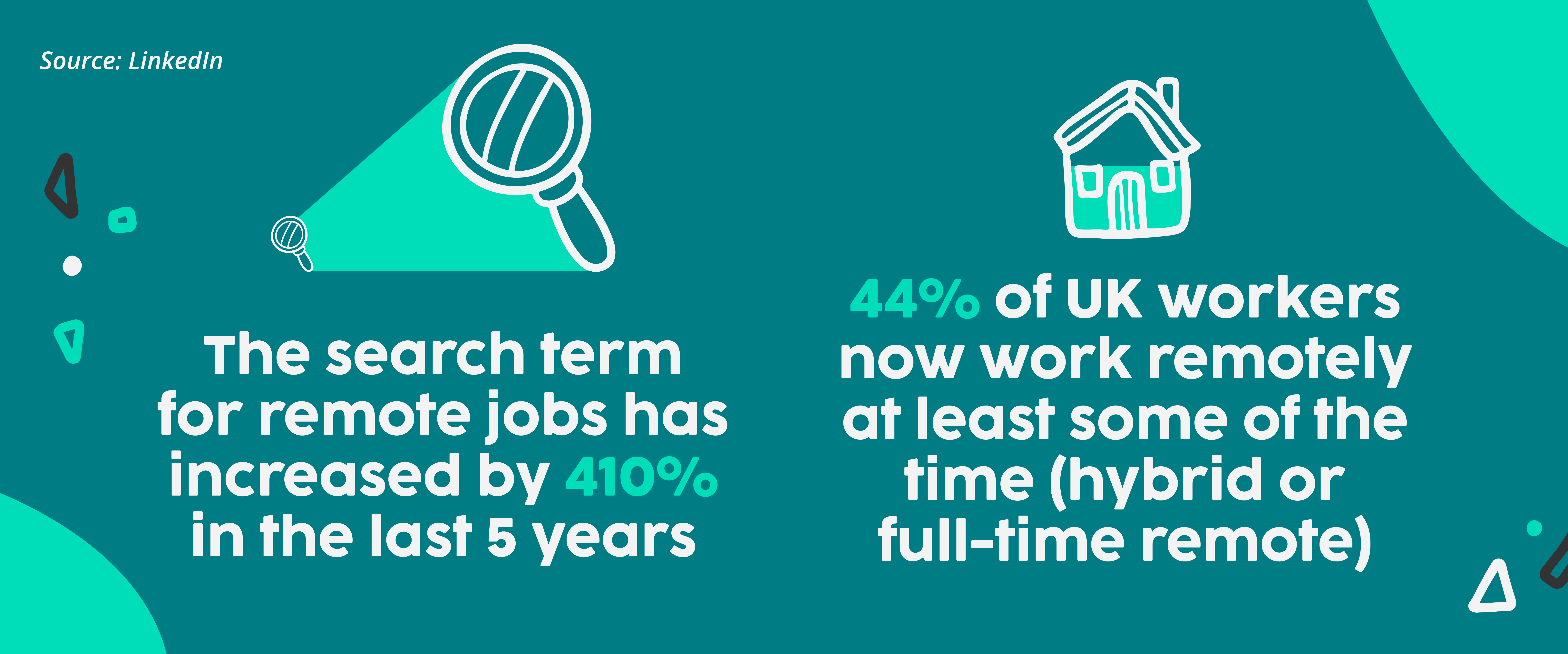
There is a notable gap between the nature of increasingly digital and hybrid working job roles and the preparedness to thrive in those roles amongst the future workforce.
According to the Generational Divide report by The Skills Network, there is an interest in embracing immersive learning technology and innovation amongst Gen Z learners.
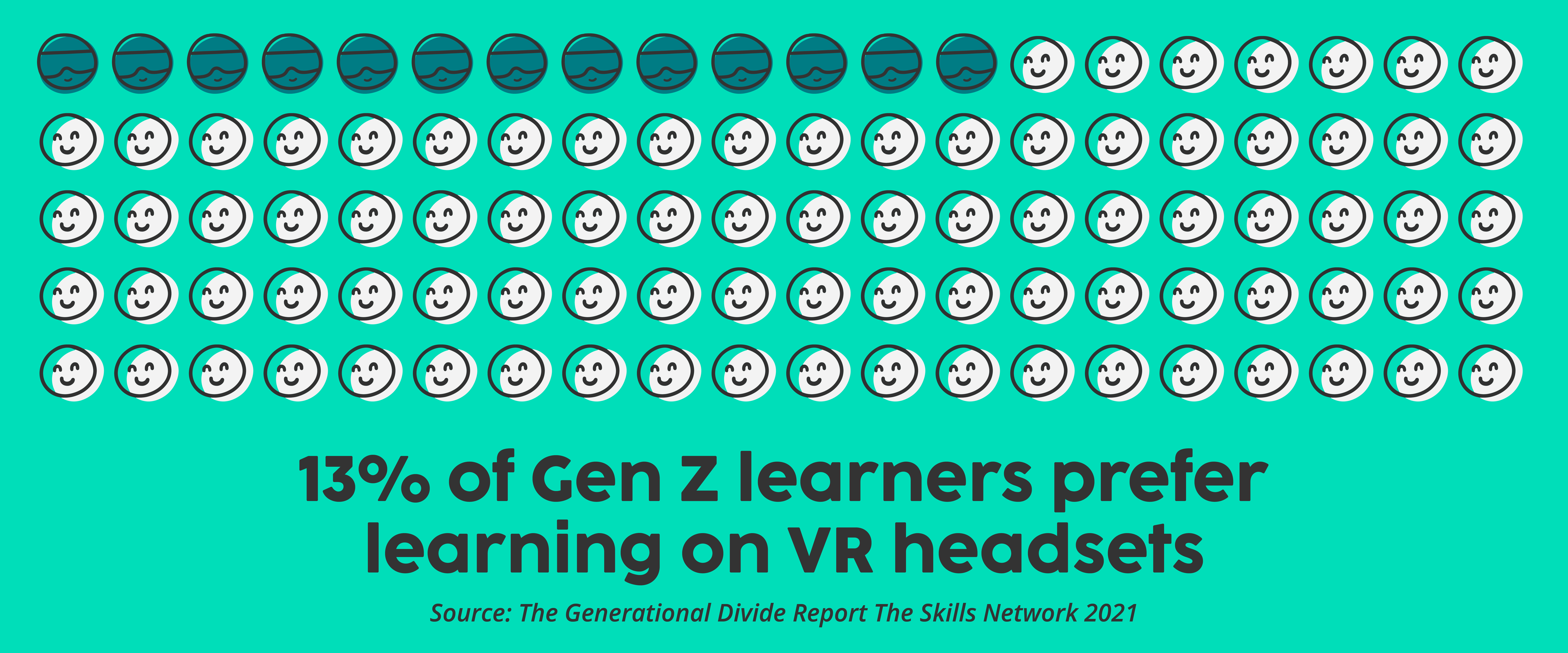
When educational institutions incorporate immersive technologies into their teaching methods, there is a potential to...
- Better prepare the learner for future hybrid or remote working
- Strengthen and expand the curriculum into an engaging blended model
- Scale education delivery at a reduced cost
- Appeal to the current learner demographic
What is the Metaverse?
So you’ve got immersive technology down. But what about the Metaverse? What is the difference between the Metaverse and immersive technologies?
In short, immersive technologies provide the means to access and experience the Metaverse.
Key features of the Metaverse include
- Evolution: The Metaverse exists and evolves over time, even when you're not actively using it. This is in contrast to traditional video games or online experiences that reset when you log off.
- Interconnectedness: Different virtual spaces, worlds, and experiences are seamlessly connected. You can move from one environment to another without distinct boundaries.
- User-Created Content: Users and brands can contribute to the Metaverse by creating and sharing digital content, ranging from virtual real estate and objects to entire virtual experiences.
- Economy: The Metaverse often involves a digital economy where virtual assets can be bought, sold, and traded using digital currencies.
The Metaverse is a much broader concept that envisions a fully interconnected digital universe, where multiple virtual spaces and realities co-exist.
Why should immersive technology and the Metaverse matter to education providers?
These cutting-edge technologies offer our education providers a new frontier for delivering dynamic, accessible, and engaging learning experiences.
Immersive technologies enable FE providers to adapt to the changing needs of students and leverage technology to enhance education in ways that were previously unimaginable.
The benefits of immersive Learning for an education provider
Immersive learning offers several advantages that enhance the learning experience and outcomes.
Some of the key benefits of immersive learning include:
- Engagement and Attention:
Immersive learning captivates learners' attention by providing interactive and realistic environments. This heightened engagement can lead to increased focus and retention of information.
- Active Learning:
Learners actively participate in their education through hands-on experiences, simulations, and problem-solving tasks. This promotes deeper understanding and critical thinking.
- Real World Application:
Immersive learning scenarios mirror real-life situations, allowing learners to practice skills and decision-making in a safe environment. This bridges the gap between theory and practice.
- Complex Problem Solving:
Immersive scenarios often involve complex challenges that require learners to analyse, strategise, and solve problems creatively and in real-time.
- Reduced Risk:
In fields where real-world mistakes can be costly or dangerous, immersive learning offers a safe environment for learners to practice without risks.
Metaverse Learning and The Skills Network Partnership

The Skills Network is proud to operate as a dedicated referral partner for Metaverse Learning, a market leader in developing and championing the integration of blended learning and AI solutions into FE delivery.
Metaverse Learning’s cutting-edge technology, combined with The Skills Network's extensive industry expertise, allows us to provide learners with the opportunity to cultivate skills and experience through easily accessible virtual platforms, tailored to their individual learning speed.
Together, through our partnership, we can help education providers re-invigorate their curriculum delivery and appeal to the evolving needs and expectations of today’s FE learners.
A spokesperson from Metaverse Learning states:
"Metaverse Learning is thrilled to announce our exciting partnership with The Skills Network.
The collaboration is a testament to our shared commitment to driving education forward by innovative and impactful means, including using cutting-edge technology to deliver immersive learning experiences through Virtual Reality, Virtual Environments and Augmented Reality.
With a mutual passion for empowering learners of all backgrounds, the partnership between Metaverse Learning and The Skills Network is set to redefine and strengthen educational experiences.
We're excited to be on this journey together!"
The potential for growth and expansion of immersive learning solutions with The Skill’s Network’s FE partners is vast, as evidenced by Metaverse Learning’s extensive course list spanning diverse sectors such as:
- Health and Social Care
- Early Years
- Construction
- Renewable Energy
- Engineering
Metaverse Learning courses: What you can expect
At the heart of any Metaverse Learning course, is its practical application in a work setting.
The Skills Network’s partnership with Metaverse Learning offers our FE Partners and learners alike the edge in work readiness and employability through practice.
Education providers can harness the power of Metaverse Learning as part of their work experience delivery; built to suit their unique needs whether that be payment per learner, per class or per institution.
Here are just some testimonials from FE providers:
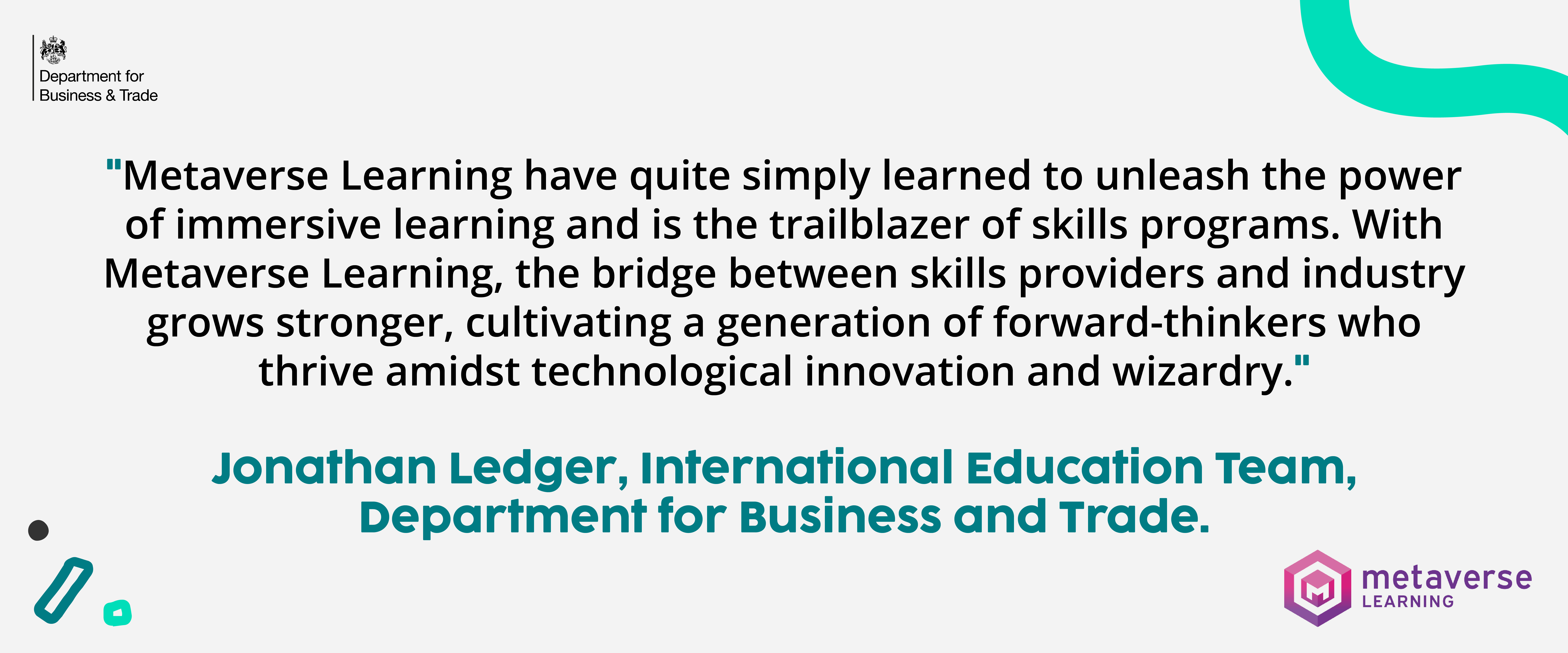
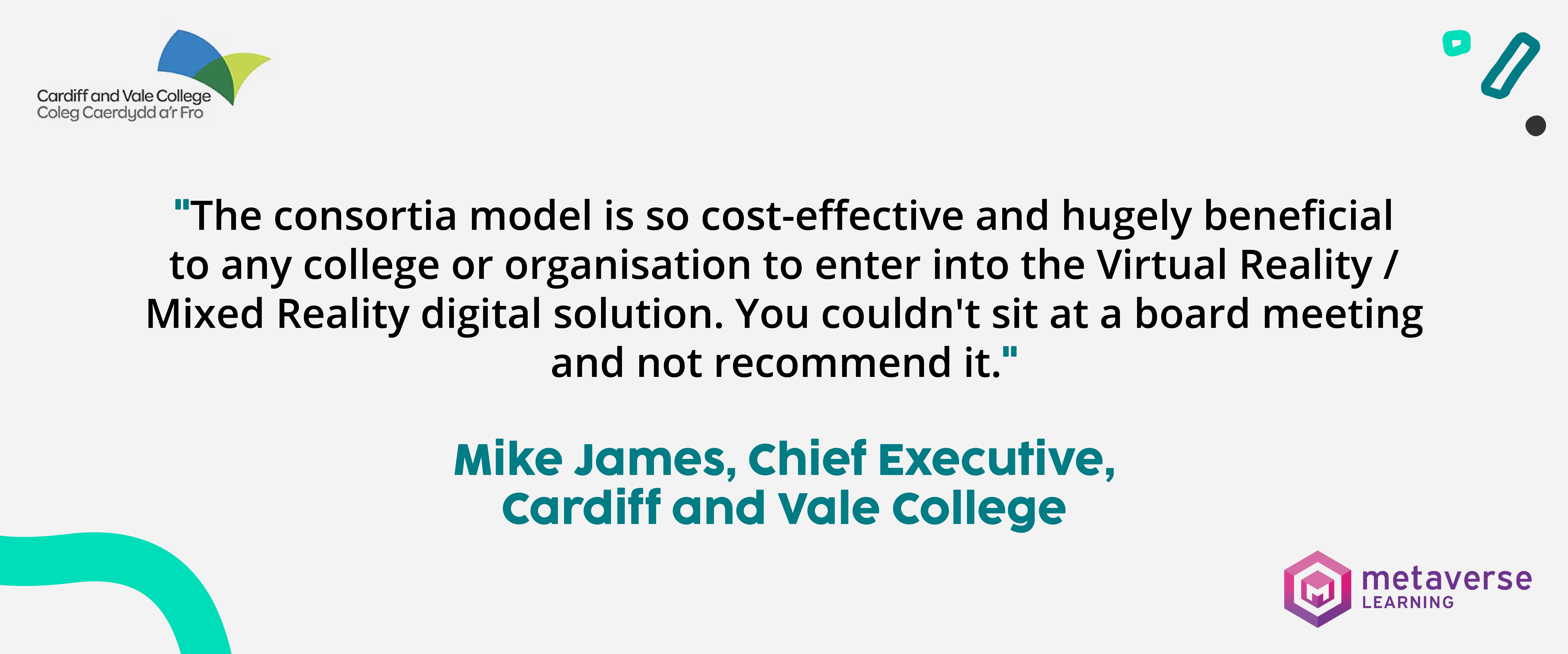
What does a Metaverse Learning course look like?
Metaverse Learning courses have been formulated to provide an authentic training experience, without any real-world risks or resource wastage.
Meticulously crafted to bolster confidence and proficiency before learners engage in real-world ventures, the immersive learning courses are mapped to Level 2 to Level 3 qualifications and align with industry standards.
Take a closer look at the Health and Social Care META course:
The Metaverse Learning Health and Social Care programme is an immersive and augmented reality-based training programme developed to support and align with a…
- Level 2 Diploma in Care
- Level 3 Diploma in Adult Care
- Level 2/3 Technical Extended Diploma in Health and Social Care
The program is intended to help develop a learner's understanding of practical, emotional and observational elements of Health and Social care and can be used to replace a significant proportion of guided learning hours as part of a blended learning approach.
Key topic areas include:
- communication and behaviours
- use and disposal of PPE
- medical equipment
- recording and reporting observations
- cleanliness, health and safety
- escalation points
- briefing information
Learners can expect 8 fully interactive virtual environment scenarios, covering different situations related to a range of patients/service users in realistic environmental settings including a hospital ward, residential home and care home.



Throughout the course, learners will assume active roles such as the below Health and Social Care job roles in both hospital and residential settings.
- Healthcare Support Workers
- Registered Nurse Practitioners
- Domiciliary Carers
All Metaverse Learning courses are compatible with PCs and tablet devices and are SCORM compliant, meaning the software can run on any education provider’s LMS- including The Skills Network’s award-winning LMS called EQUAL.
Register your interest with The Skills Network today
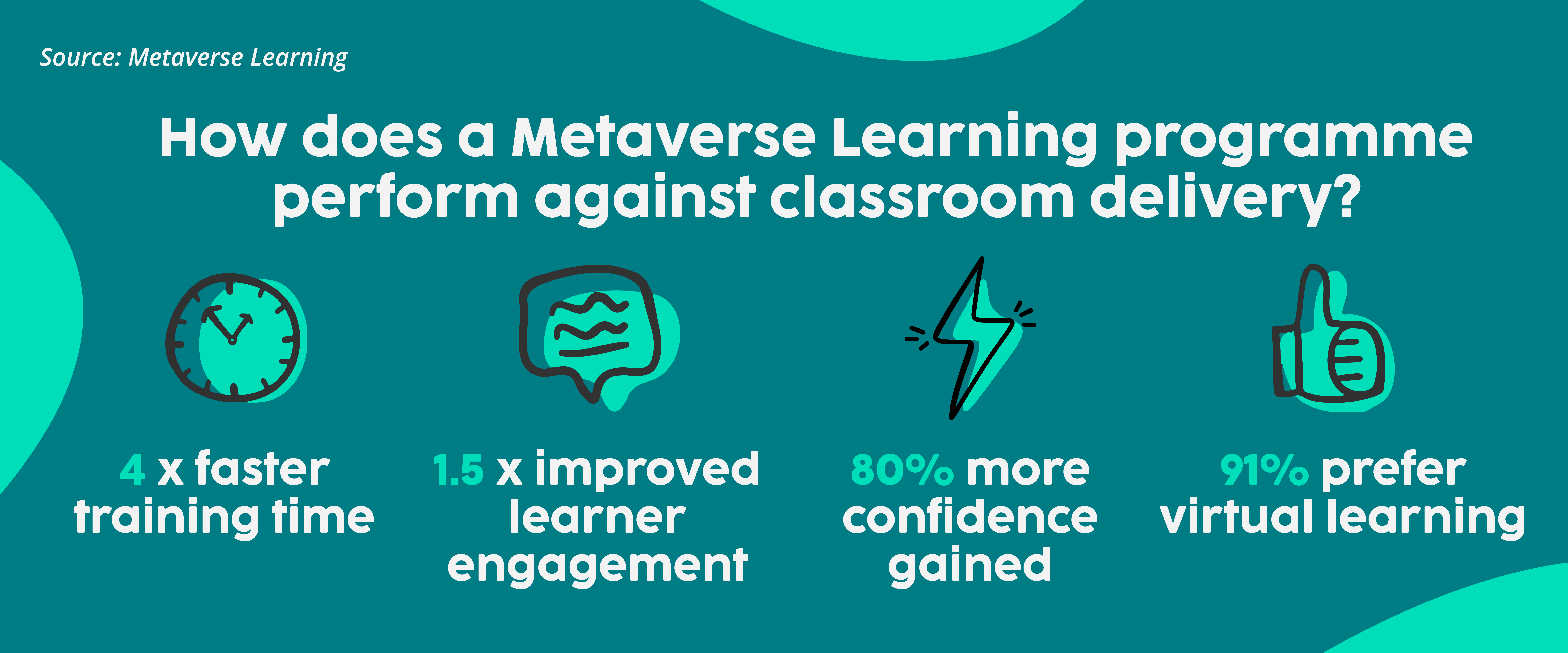
Still not sure about immersive learning technology?
Listen to what Cambria College had to say after enrolling their students on the Metaverse Learning Health and Social Care programme.
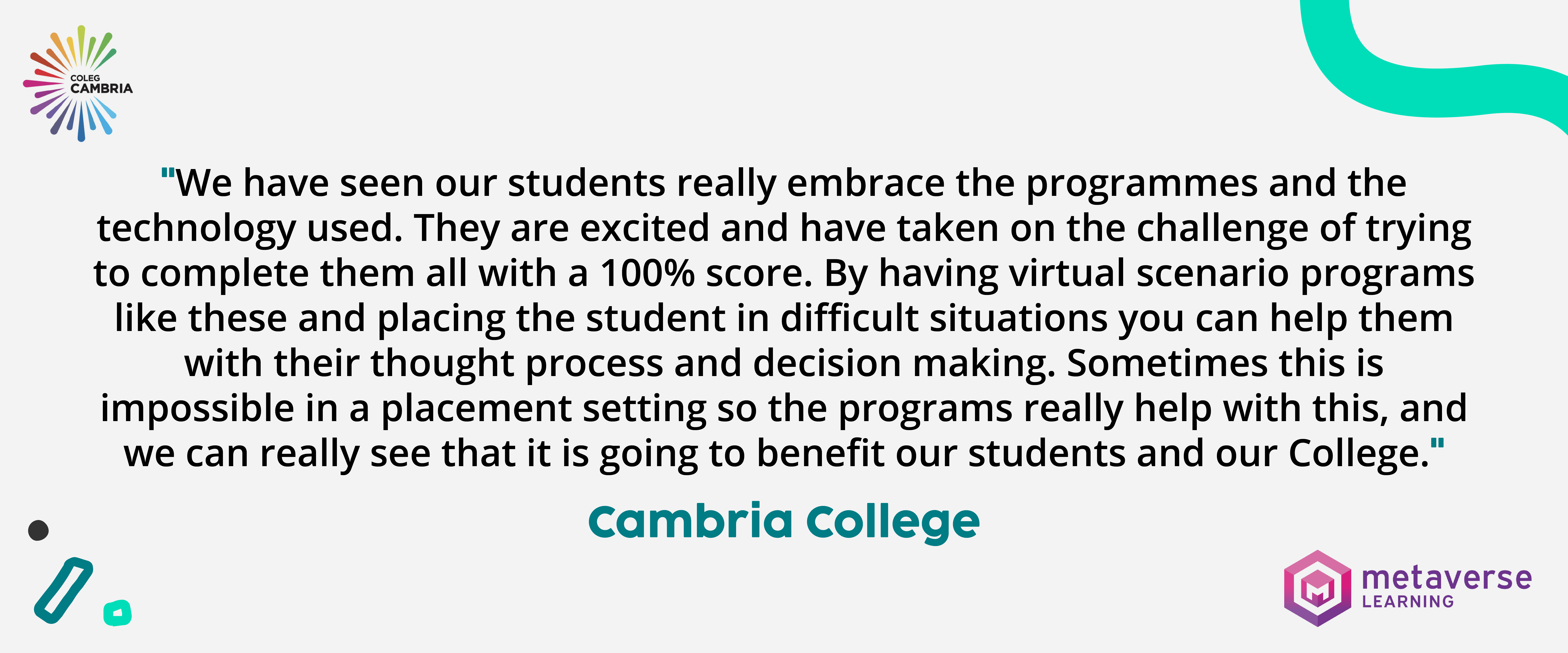
To conclude, generational learner needs and behaviours have fundamentally evolved therefore, so must the education landscape.
As attention spans become shorter, and hybrid working patterns become the norm, it is vital that our colleges and FE partners reflect this shift in their own curriculum delivery and embrace immersive technologies.
Together, The Skills Network and Metaverse Learning are transforming the future of education delivery for a new generation of learners. Through cutting-edge technologies and innovation, learning is no longer limited to being a passive experience but one of limitless opportunity and active engagement.
For more information about Metaverse Learning, please speak to an advisor at The Skills Network today.
Email the experts: salessupport@theskillsnetwork.com
Read more about our partnership with Metaverse Learning